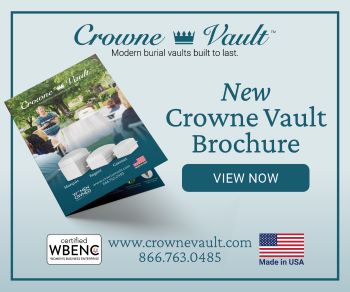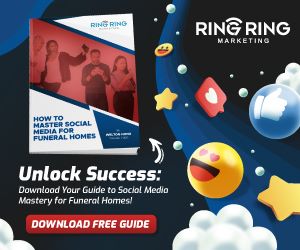Private equity continues move into Death Care
 It’s not surprising to see why in a world of 73 million baby boomers and a large group of funeral home owners planning to retire in the next five years that private equity businesses see an opportunity in Death Care, specifically in owning funeral homes.
It’s not surprising to see why in a world of 73 million baby boomers and a large group of funeral home owners planning to retire in the next five years that private equity businesses see an opportunity in Death Care, specifically in owning funeral homes.
This article from Fortune entitled “Death is anything but a dying business as private equity cashes in on the $23 billion funeral home industry” has prompted a lot of discussion, and some angst, among funeral home professionals.
The article points out that in the late 1980s and the early 1990s the funeral home industry went through a lot of consolidation and that is happening once again. Part of the driver of that phenomena is those baby boomer funeral directors — many who own funeral homes and are planning their retirement and exit with no upcoming generation to succeed the family tradition.
Those family funeral homes have been successful over the years and many have increased in value enough that it is difficult for funeral directors entering the profession to afford the purchase price that others may be willing to pay. That’s another reason that the known consolidators and start-ups funded with private equity money are coming to the table for ownership.
There is, however, among some in the profession and some in the consumer sector that believe that larger, acquisition ownership companies, driven by private equity and public ownership are not good for the future of death care. Their basic argument is that instead of consolidating assets and working to lower price via economies of scale, that these operators will reduce competition and increase the price to consumers.
It’s easy to understand that the consolidators argue back that claim.
Funeral Director Daily take: I think the Fortune article is really good and you should read it. As a former funeral home owner and one who sold his funeral home to a regional operation, I do think, however, that the situation of succession is much more nuanced and much more complicated than just being about selling, raising prices, and going on one’s way.
Our family funeral home was founded in 1872, and is celebrating its 150th anniversary this year. I was the 4th generation in my family to assume the position of manager/funeral director/ operator of the funeral home after my father’s death. I was, and still am, very proud of our family’s heritage in helping families in my community during the loss of their loved ones and helping them move from grief to remembrance. It’s a heritage that I felt privileged to have been able to help with.

Tom Anderson
Funeral Director Daily
That being said, the desire to retire and have less responsibilities found its way to me. There were other things in life I was interested in doing and there was no way to do them while still being employed at the funeral home full time. Our two sons, with whom we never applied any pressure to “follow the family footsteps” were about college aged and we knew that they had other life desires that didn’t include owning a funeral home.
And, like others in the business, we had been successful and grew the operation which had increased its value. We talked with employees about succession but at the end of the day they were either uninterested in owning or would not be able to raise the amount of capital, even at a discounted sales price, that we thought fair.
We took our funeral home to market and I wanted an owner who understood the day to day struggles of funeral directors. We found that in a CEO of a regional company that had many of the same values as I did about funeral service. That’s not to say that there are not bumps in the road moving forward — it’s very different operating a funeral home from the outside than it is being there day to day, everyday, like an owner operator.
It was difficult for me to give up ownership of the family business. I feel tremendous allegiance to my great-grandfather, grandfather, and father who served before I did. I had plenty of talks with them at the cemetery during the time we were contemplating the sale of the business. However, I also know that my great-grandfather came across the Atlantic Ocean to America in 1872 not knowing what it would bring to him and his young bride. He was skilled in the cabinet trade and that led to building coffins. . . . .and we grew from there. And, I’m pretty sure he would rest easy if he knew the business he started provided business opportunities for his descendants spanning parts of three centuries.
I’m happy, my boys are happy in their careers and our funeral home continues to serve families in our community with compassion. That’s a win for all of us.
Yes. . . the consolidators, whether on a regional or national scale, will continue to grow as there are more owners who find themselves in the situation that I found myself in. They do, however, have to make a profit to keep providing that service. My hope is that they operate their businesses with compassion for the families they serve while offering opportunities for their employees for advancement in a way that many family-owned funeral homes never can.
I also believe that while the regional or national consolidators have a leg-up on acquiring the heritage firms that go to market, there is a tremendous opportunity for young funeral directors in the niche side of the profession. It’s not always about finding the cash to buy the current operator out. It may be about operating a cremation only business, or an alkaline hydrolysis only business, or a green funeral home. In my opinion there is the same opportunity in the new ways of human disposition that built the cremation only operators back in the 1970’s. Quite frankly, like the cremation operations in the 1970’s, I believe that this time period may offer generational potential in what are now niche death care businesses.
I also believe that in a lot of communities scrapping the necessary amount needed to do that from family and friends may in the end. . . twenty or thirty years down the road. . . be a much more prosperous venture than getting a huge loan or bringing in an equity partner to buy out the big guy in town who is doing business in the traditional way. . . . And this may be especially true if it turns out to be that private equity and the big players raise the death-care costs to consumers.
The opportunities are still out there in this profession. Those that search them out and work hard will probably find them.
More news from the world of Death Care:
- Dignity (plc) swings to interim loss on Covid-19 related challenges. Morningstar
- To honor their late toddler, Seabrook couple launched a foundation to help pay for children’s funerals. Houston Chronicle (TX)
- Funeral home worker dismissed after embalming accident, awarded $13,500 in costs. Stuff (New Zealand)
- Incredible progress being made in restoring Newark Union Church and Cemetery. Delaware Public Media (DE)
- Why funerals are important. A time for talking, sharing, reflecting. St. Alban’s Messenger (VT)
- Is human composting the Greenest Burial Option? How Stuff Works.
Enter your e-mail below to join the 2,909 others who receive Funeral Director Daily articles daily:






















Interesting article. However, I believe the valuation ranges are grossly misstated. I’ve seen funeral homes sell for 7-9x EBITDA; 7-9x revenue would imply ~40x EBITDA!
Most private equity firms have an end goal of of either selling to a corporate or consolidate a large enough group of independent funeral homes and take the group public